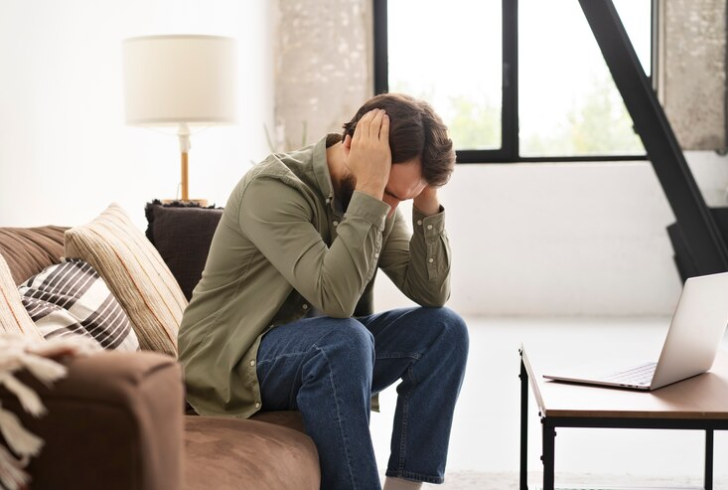Can low testosterone cause anxiety ? Testosterone, the primary male sex hormone, plays a vital role in a man's health. It influences everything from bone strength and muscle mass to sperm production and sex drive. But did you know low testosterone levels might also be linked to anxiety? Let's delve into the fascinating world of testosterone and explore how it can impact your mental well-being.
Understanding Anxiety and Depression

Image by freepik | Understanding Anxiety and Depression: Common mental health issues in the United States.
Before we dive into the testosterone-anxiety connection, it's important to understand anxiety and depression. These are two prevalent mental health conditions affecting millions of people in the United States. Anxiety disorders, for instance, impact over 40 million adults, causing persistent feelings of fear or worry that disrupt daily life. Depression, on the other hand, is a serious mood disorder affecting how you think, feel, and behave. It can impact your quality of life.
Anxiety and depression manifest through various symptoms, both psychological and physical. Common signs of anxiety include excessive worry, sweating, insomnia, irritability, rapid heartbeat, and nightmares. Depression can cause feelings of hopelessness, loss of interest in activities you once enjoyed, decreased libido, trouble concentrating, and even thoughts of suicide.
While the exact causes of these conditions remain unclear, research suggests a combination of genetic and environmental factors might be at play. Family history, traumatic events, lifestyle choices, and certain medical conditions can all contribute to the development of anxiety or depression.
Can Low Testosterone Cause Anxiety?
Now, back to the question: can low testosterone cause anxiety? The answer appears to be a tentative yes. Testosterone is not a physical hormone; it also plays a role in mental health. It might influence serotonin levels in the brain, a chemical associated with feelings of happiness and well-being. When testosterone levels dip, a lack of serotonin could contribute to depression.
It's important to note, but, that distinguishing between low testosterone and depression can be tricky. Low testosterone can cause physical symptoms like decreased muscle mass and bone loss, while depression can manifest as aches, pains, headaches, and sleep issues.
Here's another interesting twist: stress can also affect testosterone levels. When you're stressed, your body produces more cortisol, the stress hormone. This, in turn, can lead to a decrease in testosterone. This creates a vicious cycle – increased stress lowers testosterone, which might then worsen anxiety symptoms.
Furthermore, low testosterone can contribute to sexual dysfunction, like erectile dysfunction (ED). If you're struggling with ED or other sexual performance issues, this could lead to anxiety or depression worsening over time.
So, can low testosterone cause anxiety or depression?

Image by freepik | Consulting a healthcare pro is essential to uncover the root cause of anxiety or depression before treatment.
The answer is complex. Both low testosterone and mood disorders share similar symptoms. So, consulting a healthcare professional is crucial to determine the root cause of your anxiety or depression before starting any treatment.
Addressing Low Testosterone and Anxiety
There are effective treatment options available for both low testosterone and anxiety/depression. If your anxiety or depression stems from low testosterone, improving your testosterone levels might reduce those symptoms. Testosterone replacement therapy (TRT) is a potential solution. TRT involves taking prescription testosterone in various forms, such as pills, implants, gels, patches, or injections. It can lead to a stronger sex drive, improved sexual function, and, a better mood.
For men with testosterone levels on the lower end of the normal range, certain lifestyle changes might also be beneficial. Getting enough sleep, exercising , maintaining a balanced diet, managing stress, and incorporating specific supplements like zinc, magnesium, and vitamin D can all contribute to a natural testosterone boost.
If you're experiencing anxiety or depression symptoms, lifestyle modifications can also play a significant role in managing these conditions. Exercise, healthy eating, good sleep hygiene, and stress reduction techniques can all help reduce symptoms. Additionally, talk therapy and medication are two other common treatment options for mental health conditions.
Talk therapy, also known as psychotherapy, can provide relief from anxiety and depression by helping you identify and change negative thoughts, emotions, or behaviors impacting your well-being. Cognitive behavioral therapy (CBT) is a particularly effective type of therapy for anxiety and depression. It focuses on identifying and changing negative thought patterns.
Depending on the severity of your symptoms, therapy alone might be enough. But, some individuals may also benefit from medication, such as antidepressants like sertraline or anti-anxiety medications like propranolol. A licensed psychiatrist can work with you to determine the best course of action for your individual needs, whether it's therapy, medication, or a combination of both.
Can Low Testosterone Cause Anxiety? The Takeaway

Image by freepik | Low testosterone may trigger anxiety or depression. Watch for fatigue, irritability.
While the answer isn't a simple yes or no, low testosterone can potentially contribute to anxiety or depression. If you're experiencing symptoms like fatigue, irritability, decreased sex drive, along with anxiety or depression, it's crucial to consult a healthcare professional. They can help you determine the underlying cause and recommend the most appropriate treatment plan. Remember, effective treatments exist for both low testosterone and mental health conditions. With the right approach, you can achieve a healthier and happier you.
Here are some additional key takeaways to remember:
- Early diagnosis is essential. If you suspect you might have low testosterone or are experiencing symptoms of anxiety or depression, don't hesitate to reach out to a healthcare provider. Early intervention can significantly improve your quality of life.
- Open communication is key. Be open and honest with your doctor about your symptoms and concerns. The more information they have, the better equipped they are to make an accurate diagnosis and recommend the most effective treatment plan.
- Treatment is a journey, not a destination. Whether you're addressing low testosterone, anxiety, depression, or a combination of these, remember that treatment is a process. It might take some time to find the right approach that works best for you. Be patient, consistent, and committed to your treatment plan for optimal results.
By understanding the potential link between low testosterone and anxiety, you can take charge of your health and well-being. Remember, you're not alone. Millions of men grapple with these conditions, and there is help available. With proper diagnosis and treatment, you can manage your symptoms and live a fulfilling life.




